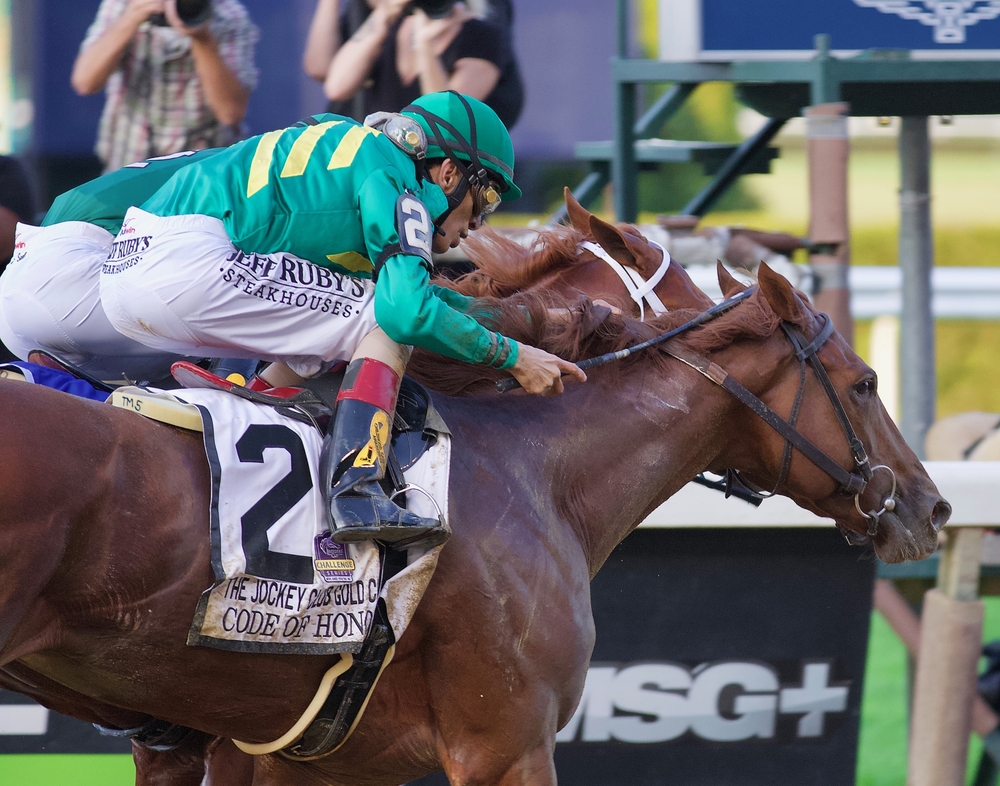Horse racing is a popular sport worldwide, and it’s no surprise that many people are interested in betting on it. However, with so many races and horses to choose from, it can be overwhelming for beginners to know where to start. The good news is that there are simple horse racing systems that work, and with a bit of knowledge and practice, anyone can use them to increase their chances of winning.
Understanding horse racing systems is essential for anyone looking to bet on horse races. There are several types of systems, including those based on form analysis, speed ratings, and betting trends. Some systems are more complicated than others, but the key is to find one that suits your style and level of expertise. By analysing and selecting races based on a system, you can increase your chances of finding profitable bets.
One of the most important things to keep in mind when using a horse racing system is to manage your risks and bet responsibly. While there is no guaranteed way to win every bet, using a system can help you make more informed decisions and reduce the impact of chance. By staying disciplined and sticking to your system, you can improve your chances of long-term success.
Key Takeaways
- Understanding horse racing systems is essential for successful betting.
- Simple horse racing systems can be effective for beginners.
- Managing risks and betting responsibly is crucial for long-term success.
Understanding Horse Racing Systems
Horse racing systems are a set of rules and methodologies used to identify bets that have a perceived profitable angle. These systems can be based on luck, guesswork, or investigation of form, races, favourites, trainers, jockeys, and winners.
One of the most popular types of horse racing systems is the form-based system. This system involves analyzing the recent form of horses and identifying those that have shown good performances in their previous races. The theory is that horses that have recently performed well are more likely to perform well in their next race.
Another popular type of system is the trainer-based system. This system involves analyzing the performance of trainers and identifying those who have a good track record of producing winning horses. The theory is that trainers who have a good track record are more likely to produce winning horses in the future.
Jockey-based systems are also popular. This system involves analyzing the performance of jockeys and identifying those who have a good track record of riding winning horses. The theory is that jockeys who have a good track record are more likely to ride winning horses in the future.
Horse racing systems can vary greatly in complexity, with some systems being relatively simple and others being more complex. Simple systems may involve identifying the favourite in a race and betting on that horse, while more complex systems may involve analyzing multiple factors to identify the most profitable bets.
It is important to note that no horse racing system is foolproof, and there is always an element of risk involved in betting on horse races. However, using a well-researched and tested system can increase the chances of making a profit in the long run.
Types of Horse Racing Systems
When it comes to horse racing systems, there are various types that a punter can use to increase their chances of winning. These systems can be divided into different categories based on the strategies they employ. Here are some of the most popular types of horse racing systems:
Backing Systems
Backing systems are the most common type of horse racing system. They involve selecting horses to back based on a set of criteria, such as form, ratings, or odds. These systems are designed to identify horses that are likely to win, and they can be used for both flat and jump racing.
Laying Systems
Laying systems involve selecting horses to lay, or bet against, based on a set of criteria. These systems are designed to identify horses that are unlikely to win, and they can be used for both flat and jump racing.
Dutching Systems
Dutching systems involve betting on multiple horses in a single race to increase the chances of winning. This strategy involves calculating the correct stake for each bet to ensure a profit, regardless of which horse wins.
Scalping Systems
Scalping systems involve placing bets on both sides of a market to take advantage of small price movements. This strategy requires quick thinking and a good understanding of how to compare odds across different betting exchanges.
Matched Betting Systems
Matched betting systems involve using free bets and bonuses offered by bookmakers to guarantee a profit. This strategy requires a good understanding of how betting exchanges work and how to find the best odds.
Accumulator Betting Systems
Accumulator betting systems involve placing multiple bets on different races to increase the potential payout. This strategy requires a good understanding of how to calculate odds and how to manage risk.
Flat Racing Systems
Flat racing systems are designed specifically for flat racing and involve selecting horses based on a set of criteria, such as form, ratings, or odds. These systems can be used for both handicaps and non-handicap races.
In summary, there are various types of horse racing systems that punters can use to increase their chances of winning. Each system has its unique strategy, complexity, and level of risk, so it’s important to choose one that suits your betting style and experience.
Analysing and Selecting Races
When it comes to selecting races to bet on, several factors can be taken into consideration. One of the most important is research. By researching the latest trends and contenders, bettors can gain valuable information that can help them make more informed selections.
Data analysis is also crucial when it comes to selecting races. By analysing data such as previous race results, jockey and trainer statistics, and track conditions, bettors can gain a better understanding of which horses are most likely to perform well in a given race.
Another important factor is logic. By using logical reasoning, bettors can eliminate horses that are unlikely to perform well and focus their attention on those that have a better chance of success.
When it comes to making selections, several different approaches can be taken. Some bettors prefer to focus on specific types of races, such as handicaps or maiden races, while others prefer to focus on specific horses or jockeys.
Ultimately, the key to success when it comes to selecting races is to remain focused and disciplined. By taking the time to research and analyse data, and by using logical reasoning to make selections, bettors can increase their chances of success and enjoy more profitable betting experiences.
Profit and Value in Horse Racing Systems
Profit and value are two crucial concepts in horse racing systems. Profitability is the ultimate goal of any betting strategy, and finding value is the key to achieving it.
Value in horse racing is about identifying opportunities where the odds offered by bookmakers are higher than the true probability of a horse winning. In other words, it’s about finding horses that are priced too high in relation to their chances of winning.
One way to find value is to look for horses that are not the favourites but have a good chance of winning. This is because bookmakers tend to overprice the favourites, so there is often little value in backing them. Instead, focus on horses that have a realistic chance of winning but are not being backed heavily by the public.
Another way to find value is to look for horses that have a good record on a particular type of track or under specific conditions. For example, if a horse has a good record on a soft track, it may be undervalued if the track is expected to be soft on race day.
Profit is the amount of money you make from your betting strategy over a given period. To be profitable, your betting strategy must generate a positive return on investment (ROI). This means that the amount you win must be greater than the amount you bet.
One way to increase your profit is to look for opportunities where you have an edge over the bookmaker. An edge is any advantage you have that gives you a better chance of winning than the bookmaker’s odds suggest.
To find opportunities where you have an edge, you need to do your research and analyse the data. Look for patterns in the form of horses, trainers, jockeys, and tracks. Use this information to identify horses that are undervalued by the bookmaker.
In summary, profit and value are two crucial concepts in horse racing systems. Finding value is the key to profitability, and identifying opportunities where you have an edge is the key to increasing your profit. By doing your research and analysing the data, you can find horses that are undervalued and increase your chances of making a profit.
Understanding and Managing Risks
Horse racing betting can be a risky business, and bettors need to understand and manage the risks involved. One of the biggest risks in horse racing betting is losing cash, which can be a significant issue for those who do not have a proper budget in place. Therefore, it is essential to set a budget and stick to it.
Another risk in horse racing betting is the unpredictability of the sport. Even the best horse racing systems can be wrong, and bettors need to understand that there is no foolproof system. Therefore, it is important to manage expectations and not rely on a single system to guarantee payouts.
Bettors can also manage risks by diversifying their bets. Instead of putting all their eggs in one basket, bettors can spread their bets across different races and horses. This reduces the risk of losing all their cash on a single bet.
It is also important for bettors to do their research before placing bets. This includes looking at the form of the horses, the jockeys, the track conditions, and any other relevant factors that may affect the outcome of a race. This information can be found in racing form guides and other resources.
Finally, bettors need to understand the payout structure of horse racing betting. Different types of bets have different payouts, and it is important to understand the risks and rewards of each type of bet. For example, a straight bet on a single horse has a higher risk but also a higher potential payout, while an exotic bet like a trifecta has a lower risk but a lower potential payout.
In summary, managing risks in horse racing betting involves setting a budget, diversifying bets, doing research, and understanding the payout structure. While there is no foolproof system, bettors can increase their chances of success by managing risks effectively.
Comparing Betting Sites
When it comes to betting on horse racing, choosing the right betting site can make a big difference in the overall experience and potential profits. There are many betting sites and bookies to choose from, each with its strengths and weaknesses. Here are some factors to consider when comparing betting sites:
Odds
One of the most important factors to consider when choosing a betting site is the odds they offer. Different sites may have different odds for the same race, so it’s important to shop around and find the best value. Some sites may also offer promotions or bonuses that can boost the odds even further.
User Experience
A good user experience can make a big difference in the overall enjoyment of betting on horse racing. Look for sites that are easy to navigate, have a clean and intuitive interface, and offer a variety of betting options. Some sites may also offer live streaming of races, which can enhance the betting experience even further.
Payment Options
Different betting sites may offer different payment options, so it’s important to choose a site that offers convenient and secure payment methods. Look for sites that accept a variety of payment options, such as credit cards, e-wallets, and bank transfers. It’s also important to consider the fees and processing times associated with each payment method.
Customer Support
Good customer support can make a big difference in resolving any issues or questions that may arise while betting on horse racing. Look for sites that offer multiple ways to contact customer support, such as phone, email, and live chat. It’s also important to consider the responsiveness and helpfulness of the customer support team.
Reputation
Finally, it’s important to consider the reputation of the betting site or bookie. Look for sites that are licensed and regulated by reputable authorities, and have a history of paying out winnings in a timely and fair manner. Reading reviews and feedback from other users can also provide valuable insights into the overall reputation and trustworthiness of a betting site.
Understanding Statistics and Probability
When it comes to horse racing, understanding statistics and probability is crucial. Horse racing is a sport that involves many variables, and it can be challenging to predict the outcome of a race. However, by using statistical analysis and probability theory, bettors can improve their chances of making profitable wagers.
Statistics play a vital role in horse racing. Bettors can use data such as a horse’s past performance, jockey and trainer records, and track conditions to make informed decisions. By analysing this data, bettors can identify trends and patterns that can help them predict the outcome of a race.
Probability theory is also essential in horse racing. Bettors can use probability to calculate the likelihood of a particular horse winning a race. By understanding the probability of each horse winning, bettors can make more informed wagers and increase their chances of winning.
However, it is essential to be careful when using statistics and probability in horse racing. Back-fitting, also known as data dredging, is a common mistake that bettors make. Back-fitting involves using historical data to fit a model that predicts the outcome of a race. While this can be useful, it can also lead to overfitting and inaccurate predictions.
Therefore, it is crucial to use statistics and probability in a careful and considered manner. Bettors should be aware of the limitations of their data and avoid making exaggerated or false claims. By using statistics and probability responsibly, bettors can improve their chances of making profitable wagers in horse racing.
Getting Started with Simple Systems
For beginners, getting started with horse racing betting can be a daunting task. There are countless betting strategies and systems to choose from, and it can be difficult to know where to begin. However, some simple horse racing systems have been proven to work over time.
When starting with simple systems, it’s important to have a clear understanding of your betting strategy and goals. Are you looking to make a profit in the short term, or are you building a long-term portfolio of bets? Knowing your goals will help you to choose the right system for you.
One simple horse racing system that is popular among beginners is the “back the favourite” system. This involves betting on the favourite horse in each race. While this system may not generate huge profits, it is a good way to build up your betting portfolio and gain experience.
Another simple system is the “place only” system. This involves betting on a horse to place (i.e. finish in the top three) rather than to win. This system can be less risky than betting on a horse to win, as you have a greater chance of winning your bet.
When starting with simple systems, it’s important to keep track of your bets and results. This will help you to identify which systems are working for you and which are not. It’s also important to be disciplined with your betting and to stick to your chosen system.
Overall, there are a variety of simple horse racing systems that can be effective for beginners. By starting with a simple system and building your portfolio over time, you can gain experience and improve your betting strategy.
Frequently Asked Questions
What is the most profitable horse racing system?
There is no one-size-fits-all answer to this question. Profitability depends on various factors, including the type of system used, the expertise of the bettor, and the current state of the market. Some systems that have shown promise in the past include laying exposed favourites, the statistical lay, and dobbing bookmakers. However, it is important to note that no system is foolproof, and bettors should always exercise caution and do their research before placing any bets.
Are there any UK horse racing systems that have been tested?
Yes, several UK horse racing systems have been tested and proven successful by experienced bettors. Some of these systems include the 80/20 horse racing strategy, the Dutching system, and the Placepot system. However, it is important to note that no system is guaranteed to be successful, and bettors should always exercise caution and do their research before placing any bets.
What is the 80/20 horse racing strategy?
The 80/20 horse racing strategy is a popular system used by many experienced bettors. The basic idea behind this strategy is to focus on the top 20% of horses in a race, as these horses are more likely to win. Bettors using this system typically look for horses with strong form, good jockeys, and favourable odds. However, it is important to note that this system is not foolproof, and bettors should always exercise caution and do their research before placing any bets.
What is the easiest bet in horse racing?
The easiest bet in horse racing is the straight bet, also known as a win bet. This is a simple bet where the bettor picks a horse to win the race. If the horse wins, the bettor collects their winnings. If the horse loses, the bettor loses their stake. Straight bets are popular with novice bettors, as they are easy to understand and require no special knowledge or expertise.
What are the 4 classics of horse racing?
The four classics of horse racing are the 2000 Guineas, the 1000 Guineas, the Epsom Derby, and the St Leger Stakes. These races are considered to be the most prestigious and important races in the UK horse racing calendar. They are open to three-year-old horses, and each race has its unique history and traditions.
Are there any unusual horse racing systems that work?
There are many unusual horse racing systems out there, and some have shown promise in the past. One such system is the Fibonacci system, which involves using a mathematical sequence to determine the size of each bet. Another unusual system is the Martingale system, which involves doubling the size of each bet after a loss. However, it is important to note that no system is guaranteed to be successful, and bettors should always exercise caution and do their research before placing any bets.





